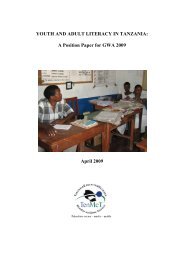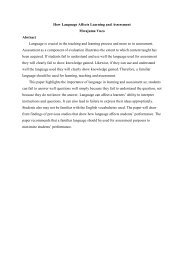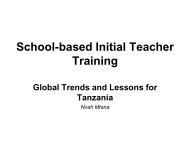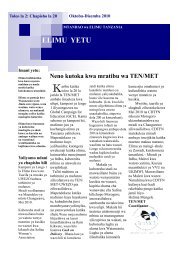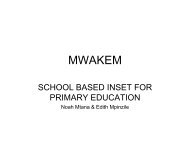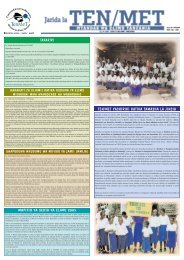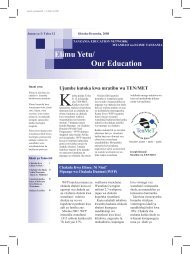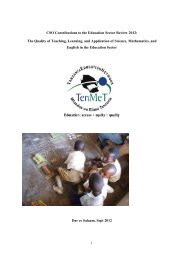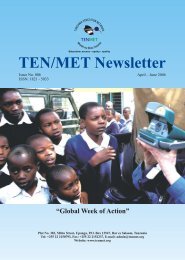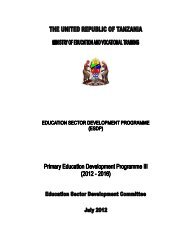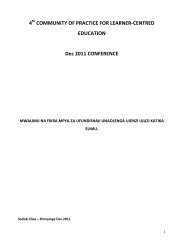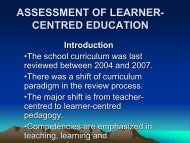at this hyperlink. - Tanzania Education Network/Mtandao wa Elimu ...
at this hyperlink. - Tanzania Education Network/Mtandao wa Elimu ...
at this hyperlink. - Tanzania Education Network/Mtandao wa Elimu ...
Create successful ePaper yourself
Turn your PDF publications into a flip-book with our unique Google optimized e-Paper software.
JOINT EDUCATION SECTOR REVIEW<br />
PERFORMANCE OF CIVIL SOCIETY ORGANIZATIONS (CSOS) IN DELIVERY OF QUALITY<br />
EDUCATION IN TANZANIA<br />
Dar es Salaam<br />
OCT 2011
TABLE OF CONTENTS<br />
TABLE OF CONTENTS .................................................................................................................... ii<br />
LIST OF ABBREVIATIONS .............................................................................................................. iv<br />
EXECUTIVE SUMMARY ................................................................................................................. v<br />
1.0. INTRODUCTION ..................................................................................................................... 1<br />
1.1. TEN/MET’s Contribution to bringing educ<strong>at</strong>ion back on course .................................................. 1<br />
1.2. Objectives ..................................................................................................................................... 2<br />
1.3. Methodology ................................................................................................................................ 2<br />
2.0. CONTRIBUTIONS OF CSOS IN DELIVERY OF QUALITY EDUCATION ............................................ 3<br />
2.1. GENERAL CSO PERFORMANCE ..................................................................................................... 3<br />
2.2. CSOS ADVOCACY FOR QUALITY EDUCATION ................................................................................ 3<br />
2.2.1. N<strong>at</strong>ional Conferences on quality of Educ<strong>at</strong>ion ...................................................................... 3<br />
2.2.2. Fighting Neg<strong>at</strong>ive Cultural aspects affecting girl child educ<strong>at</strong>ion ......................................... 4<br />
2.2.4. Radio sensitiz<strong>at</strong>ion programmes. .......................................................................................... 4<br />
2.2.5. Open educ<strong>at</strong>ion deb<strong>at</strong>es/Forum ........................................................................................... 5<br />
2.2.6. Enrolment, Retention, and Completion of Children with Disabilities in Primary School<br />
CCBRT initi<strong>at</strong>ives.............................................................................................................................. 6<br />
2.3. IMPROVING TEACHING AND LEARNING ...................................................................................... 6<br />
2.3.1. TRCs in Promoting Quality of Primary Educ<strong>at</strong>ion .................................................................. 6<br />
2.3.2. Quality of Educ<strong>at</strong>ion through TRCS by Aid et Action ............................................................ 7<br />
2.3.3. Teachers and Community Development through ICT <strong>at</strong> Aden Centre Misungwi ................. 7<br />
2.3.4. Gender Responsive Pedagogy (GRP) FAWETZ init<strong>at</strong>ives ....................................................... 7<br />
2.3.5. Improving teaching the quality of teaching In Shinyanga by Oxfam GB ............................... 8<br />
2.3.6. Quality Educ<strong>at</strong>ion through the Expert Teacher System - QUEETS ......................................... 8<br />
2.3.7. Improving Learning Environment .......................................................................................... 8<br />
2.4. INCLUSION .................................................................................................................................. 10<br />
2.3.1. Transl<strong>at</strong>ing the United N<strong>at</strong>ions Gender in Educ<strong>at</strong>ion Initi<strong>at</strong>ives ......................................... 10<br />
2.3.2. Populariz<strong>at</strong>ion version of the UN Convention on Rights of Persons with Disability ........... 10<br />
2.3.3. Promotion of Access, Retention and Good Performance for Girls and Women; TUSEME . 10<br />
2.3.4. Supporting teachers on sign language for Pre and Primary Schools .................................. 10<br />
2.4. CROSSCUTTING ISSUES .............................................................................................................. 10<br />
2.4.1. Promoting gender equality and girls educ<strong>at</strong>ion .................................................................. 10<br />
2.4.2. Gender-Students Bursary Secondary Educ<strong>at</strong>ion ................................................................. 11<br />
2.4.3. Mobile School Innov<strong>at</strong>ions by Adilisha ............................................................................... 11<br />
2.4.4. Story telling and Skillful Parenting ...................................................................................... 11<br />
ii
2.5. SCHOOL GOVERNANCE .............................................................................................................. 12<br />
2.5.1. Training to School Committees ........................................................................................... 12<br />
2.5.2. Student Councils (Baraza) ................................................................................................... 12<br />
2.5.3. Improvement of Gender based LGAs educ<strong>at</strong>ion services management ............................. 12<br />
3.0. FINANCIAL ASPECT OF TEN/MET TO QUALITY EDUCATION SERVICE DELIVERY IN TANZANIA ... 13<br />
4.0. CONCLUSION ....................................................................................................................... 15<br />
4.1. TENMET ACHIEVEMENTS ........................................................................................................... 15<br />
4.2. CHALLENGES .............................................................................................................................. 16<br />
5.0. LESSONS LEARNT ................................................................................................................. 16<br />
6.0. RECOMMENDATIONS. .......................................................................................................... 17<br />
7.0. FUTURE PROSPECTS OF TEN/MET ........................................................................................ 17<br />
ii. Strengthening Governance and Accountability in Educ<strong>at</strong>ion .................................................... 17<br />
iii. Facilit<strong>at</strong>e the Implement<strong>at</strong>ion of Educ<strong>at</strong>ion and Training Policy .............................................. 17<br />
iv. Research, Public<strong>at</strong>ion and Document<strong>at</strong>ion ............................................................................... 18<br />
v. <strong>Network</strong> Capacity Development and Sustainability .................................................................. 18<br />
Str<strong>at</strong>egic aim 1: A gender based teaching and learning environment for improved livelihood<br />
promoted ...................................................................................................................................... 18<br />
Str<strong>at</strong>egic aim 2: Governance and accountability in educ<strong>at</strong>ion improved ................................. 18<br />
Str<strong>at</strong>egic aim 3: Populariz<strong>at</strong>ion and monitoring of ETP implement<strong>at</strong>ion improved ................. 18<br />
Str<strong>at</strong>egic aim 4: Public<strong>at</strong>ion and document<strong>at</strong>ion to inform advocacy improved. ..................... 18<br />
Str<strong>at</strong>egic aim 5: <strong>Network</strong> capacity and sustainability strengthened ......................................... 19<br />
8.0. PAPER DEVELOPMENT TEAM ............................................................................................... 20<br />
iii
LIST OF ABBREVIATIONS<br />
AIDS<br />
Acquired Immunodeficiency Syndrome<br />
CAMFED<br />
CCBRT<br />
CDTFN<br />
CSOs<br />
BEDF<br />
ECD<br />
EFA<br />
ESDP<br />
FAWE<br />
GWA<br />
HIV<br />
MED<br />
MDGs<br />
MCDGC<br />
MoEVT<br />
MOHSW<br />
PMO-RALG<br />
SAWA<br />
SNV<br />
SWASH<br />
TECDEN<br />
TEN/MET<br />
TRCs<br />
TRCC<br />
UNICEF<br />
USAID<br />
WASH<br />
Campaign For Female Educ<strong>at</strong>ion<br />
Comprehensive Community Based Rehabilit<strong>at</strong>ion in <strong>Tanzania</strong><br />
Childhood Development Trust Fund <strong>Network</strong><br />
Civil Society Organiz<strong>at</strong>ions<br />
Basic Educ<strong>at</strong>ion Development Fund<br />
Early Childhood Development<br />
Educ<strong>at</strong>ion For All<br />
Educ<strong>at</strong>ion Sector Development Programme<br />
Forum for African Women Educ<strong>at</strong>ionalists<br />
Global Week of Action<br />
Human Immunodeficiency Virus<br />
Marfiki <strong>wa</strong> <strong>Elimu</strong> Dodoma<br />
Millennium Development Goals<br />
Ministry of Community Development, Gender and Children<br />
Ministry of Educ<strong>at</strong>ion and Voc<strong>at</strong>ional Training<br />
Ministry of Health & Social Welfare<br />
Prime Minister’s Office – Regional and Local Government<br />
Safina Women’s Associ<strong>at</strong>ion<br />
Netherlands Development Organiz<strong>at</strong>ion<br />
School WASH<br />
<strong>Tanzania</strong> Early Childhood Development <strong>Network</strong><br />
<strong>Tanzania</strong> Educ<strong>at</strong>ion <strong>Network</strong>/<strong>Mtandao</strong> <strong>wa</strong> <strong>Elimu</strong> <strong>Tanzania</strong><br />
Teacher Resource Centres<br />
Teachers Resource Centre Coalition<br />
United N<strong>at</strong>ions Children’s Emergency Fund<br />
United St<strong>at</strong>es Agency for Intern<strong>at</strong>ional Development<br />
W<strong>at</strong>er, Sanit<strong>at</strong>ion, & Hygiene<br />
iv
EXECUTIVE SUMMARY<br />
With the expanding responsibilities of civil society organiz<strong>at</strong>ions (CSOs) on improved educ<strong>at</strong>ion in<br />
<strong>Tanzania</strong>, it becomes important to have shared experience with other stakeholders through Annual<br />
Educ<strong>at</strong>ion Sector Reviews. TEN/MET acknowledges th<strong>at</strong> noticeable progress has been made in<br />
educ<strong>at</strong>ion in <strong>Tanzania</strong> and th<strong>at</strong> much more remains to be done to meet Educ<strong>at</strong>ion for All (EFA) goals<br />
as elabor<strong>at</strong>ed in the Millennium Development Goals (MDGs), Global Campaign for Educ<strong>at</strong>ion (GCE),<br />
<strong>Tanzania</strong> Development Vision 2025 MKUKUTA goals and Educ<strong>at</strong>ion Training Policy (ETP) targets.<br />
This paper describes the experience of CSOs’ contribution to improving the quality of educ<strong>at</strong>ion in<br />
<strong>Tanzania</strong>. The focus is to highlight CSOs’ performance in the last fiscal year in terms of achievements,<br />
challenges, lessons learnt, recommend<strong>at</strong>ions for action, and prospects. TEN/MET is a CSO member<br />
organiz<strong>at</strong>ion based network consisting of 147 active members settled in the nine working zones. The<br />
majority of them are in Northern Zone (44%) and least is South East Zone (1 % members, Refer Figure<br />
1 in the discussion).<br />
As CSOs, we have an agenda to advoc<strong>at</strong>e for a clear and well-articul<strong>at</strong>ed str<strong>at</strong>egic vision for educ<strong>at</strong>ion<br />
policy and plans coordin<strong>at</strong>ed from Ministry of Educ<strong>at</strong>ion. We also argue for equitable access to<br />
quality educ<strong>at</strong>ion made possible through inclusive educ<strong>at</strong>ion where regular schools and other<br />
educ<strong>at</strong>ional institutions plan for and meet the learning needs of all members of their communities.<br />
While last fiscal year has seen a yet more dram<strong>at</strong>ic increase in enrolments, many children and youth<br />
are still excluded from a full quality educ<strong>at</strong>ion. Equity is needed in both enrolments and other<br />
qualit<strong>at</strong>ive aspects, including gender-sensitive, child-friendly experiences in the classroom,<br />
teaching/learning m<strong>at</strong>erials, and teachers taking responsibility for all learners in a school. Therefore,<br />
the transfer of adequ<strong>at</strong>e financial resources to Local Government Authorities (LGAs) and community<br />
in general is paramount to provide appropri<strong>at</strong>e and adequ<strong>at</strong>e m<strong>at</strong>erials for all learners. CSOs also<br />
argue th<strong>at</strong> the st<strong>at</strong>us of teachers and the teaching profession are in jeopardy if educ<strong>at</strong>ion policy is<br />
not tight enough to enable the enhancement of adequ<strong>at</strong>e learning environment for teachers<br />
As a result, CSOs under TEN/MET\s coordin<strong>at</strong>ion have improved their contribution to<strong>wa</strong>rds improved<br />
quality educ<strong>at</strong>ion service delivery. CSOs member activities are diverse but coordin<strong>at</strong>ed around<br />
advoc<strong>at</strong>ing for educ<strong>at</strong>ion policy and practices improvement to enhance quality educ<strong>at</strong>ion delivery<br />
interventions.<br />
CSOs’ contribution for the last fiscal year has amounted to approxim<strong>at</strong>ely Tshs 1,423,573. Activities<br />
distribution has indic<strong>at</strong>ed th<strong>at</strong> much of the members’ effort has been to focus on issues concerning<br />
an Improved Teaching and Learning Environment (38 percent), Action Research and innov<strong>at</strong>ion (26<br />
percent), Capacity Building (13 percent), Advocacy (11 percent), School governance (9 Percent), and<br />
last, resources committed to gender issues (1 percent) (Refer to Table 1 and Figure 2).<br />
There have been several achievements for TEN/MET CSO member’s contribution to<strong>wa</strong>rds improved<br />
quality educ<strong>at</strong>ion delivery. To mention a few, these included, TEN/MET contribution to improving<br />
existing educ<strong>at</strong>ion policies and programs through its particip<strong>at</strong>ion in the Ministry of Educ<strong>at</strong>ion and<br />
Voc<strong>at</strong>ional Training (MoEVT)’s various technical working groups, committees, and taskforces.<br />
Specifically TEN/MET has improved its coordin<strong>at</strong>ing role to facilit<strong>at</strong>e CSOs members to provide<br />
inputs to diverse interventions in designing the Public Expenditure Tracking Survey, inclusion of<br />
cross-cutting issues in the Educ<strong>at</strong>ion Development interventions, the review of Cluster 2 dealing with<br />
educ<strong>at</strong>ion issues in MKUKUTA II and SCOs str<strong>at</strong>egies for providing physical educ<strong>at</strong>ion services<br />
delivery to support communities’ efforts improve educ<strong>at</strong>ion infrastructures and learning m<strong>at</strong>erials.<br />
At the Public Level, TEN/MET’s policy advocacy work has focused on coordin<strong>at</strong>ed organiz<strong>at</strong>ion of<br />
public deb<strong>at</strong>es (n<strong>at</strong>ional and zonal), and conferences; and public a<strong>wa</strong>reness raising of critical<br />
educ<strong>at</strong>ional issues around commemor<strong>at</strong>ive events, e.g., Global Week of Action.<br />
v
An increasing engagement of MoEVT officials in different educ<strong>at</strong>ion events, performing official<br />
launches, presenting papers in conferences and deb<strong>at</strong>es organized by TEN/MET, is highly significant<br />
in th<strong>at</strong> TEN/MET has positioned itself well as one of the key development partners advising and<br />
complementing government efforts for improving the quality of educ<strong>at</strong>ion in <strong>Tanzania</strong>. There has<br />
been increased visibility of TEN/MET <strong>at</strong> the district level through the enrolment of 79 new members,<br />
the form<strong>at</strong>ion of three District <strong>Network</strong>s, and TEN/MET’s website. Inform<strong>at</strong>ion sharing and<br />
a<strong>wa</strong>reness of educ<strong>at</strong>ion policies and other critical educ<strong>at</strong>ion issues among members have improved<br />
through the organiz<strong>at</strong>ion of inform<strong>at</strong>ion sharing meetings in the regions, distribution of public<strong>at</strong>ions<br />
and particip<strong>at</strong>ion in Breakfast Deb<strong>at</strong>es organized by Haki<strong>Elimu</strong> in collabor<strong>at</strong>ion with Policy Forum.<br />
On a broader level, TEN/MET’s networking activities and its role of mobilizing and representing a<br />
collective voice of educ<strong>at</strong>ion CSOs has been valued in the context of the macro development<br />
paradigm of strengthening civil society, democr<strong>at</strong>ic development, and good governance in <strong>Tanzania</strong>.<br />
Regardless of the mentioned achievements, TEN/MET has encountered challenges as well. These can<br />
be summarized as follows:<br />
Low understanding of the current competence based curriculum by key educ<strong>at</strong>ion actors<br />
(inspectors, teachers, <strong>wa</strong>rd educ<strong>at</strong>ion coordin<strong>at</strong>ors etc,) limits them from achieving innov<strong>at</strong>ions<br />
for enhancing quality educ<strong>at</strong>ion development. For example, very recently it has been observed<br />
th<strong>at</strong> the primary school pupils have been using old curriculum setup while exams have been<br />
developed using the competence-based curriculum.<br />
Under-utiliz<strong>at</strong>ion of teacher resource centres (TRCs). Most of the existing TRCs are not effectively<br />
utilized due to lack of resources and weak management.<br />
Low capacity of CSOs in lobbying and advocacy practices <strong>at</strong> local levels.<br />
Absence of Educ<strong>at</strong>ion Regul<strong>at</strong>ory Authority. The Regul<strong>at</strong>ory Authority as an advisory body with<br />
mand<strong>at</strong>es to ensure th<strong>at</strong> educ<strong>at</strong>ion financing directives and guidelines are managed according to<br />
the constitution and other guiding development policies (MDGs, EFA, and MKUKUTA) is missing<br />
in the educ<strong>at</strong>ion sector structures. This gap constrains the oper<strong>at</strong>ionaliz<strong>at</strong>ion of binding cords like<br />
excessive central government control th<strong>at</strong> could have been reduced by the Educ<strong>at</strong>ion Regul<strong>at</strong>ory<br />
Authority.<br />
From our intervention on addressing educ<strong>at</strong>ion issues, several lessons learned have been taken on<br />
board for improving activity implement<strong>at</strong>ion. These lessons include:<br />
Enrolment of children with disabilities in all levels is still very low, thus deliber<strong>at</strong>e efforts by CSOs<br />
and other educ<strong>at</strong>ion actors are desired to mitig<strong>at</strong>e the situ<strong>at</strong>ion.<br />
Inclusive educ<strong>at</strong>ion has big potential to increase accessibility of educ<strong>at</strong>ion to children with<br />
disabilities. Therefore, best practices need to be sustained and improved to promote friendly<br />
str<strong>at</strong>egies for inclusiveness.<br />
Environmental, institutional, and <strong>at</strong>titudinal barriers are the big challenge for effective<br />
implement<strong>at</strong>ion of quality educ<strong>at</strong>ion programmes. More inclusive and focused str<strong>at</strong>egy is needed<br />
to address the situ<strong>at</strong>ion.<br />
The particip<strong>at</strong>ory process for implementing CSOs activities has been efficient and cost effective.<br />
This approach needs to be improved further and sustained.<br />
The recommend<strong>at</strong>ions from CSOs highlight th<strong>at</strong>:<br />
New school constructions need to take into account the needs of children with disabilities and<br />
the old ones needs to be renov<strong>at</strong>ed to accommod<strong>at</strong>e children with disabilities.<br />
Government should provide teaching and learning m<strong>at</strong>erials as well as assistive devices to<br />
children with disabilities.<br />
vi
Inclusive educ<strong>at</strong>ion should be included in the Teacher Training Curriculum.<br />
The MoEVT should start implementing Inclusive Educ<strong>at</strong>ion Str<strong>at</strong>egy to ensure th<strong>at</strong> school age<br />
children access educ<strong>at</strong>ion without limit<strong>at</strong>ions<br />
Currently the focus if improved educ<strong>at</strong>ion should be on quality educ<strong>at</strong>ion services provision as<br />
the quantity perspective of educ<strong>at</strong>ion has adequ<strong>at</strong>ely been addressed by the government and<br />
other development partners.<br />
The future prospects of TEN/MET highlights the <strong>wa</strong>y for<strong>wa</strong>rd for the network on its course for<br />
strengthening CSO members’ particip<strong>at</strong>ion in the network. The coming TEN/MET str<strong>at</strong>egic direction<br />
will focus on scaling up its c<strong>at</strong>alytic, facilit<strong>at</strong>ive, and coordin<strong>at</strong>ing role. To th<strong>at</strong> end, the network will<br />
concentr<strong>at</strong>e its activities around the following areas:<br />
Improving Teaching and Learning Environments<br />
Strengthening Governance and Accountability in Educ<strong>at</strong>ion<br />
Facilit<strong>at</strong>e the Implement<strong>at</strong>ion of Educ<strong>at</strong>ion and Training Policy<br />
Research, Public<strong>at</strong>ion and Document<strong>at</strong>ion<br />
<strong>Network</strong> Capacity Development and Sustainability<br />
To<strong>wa</strong>rds <strong>this</strong> end TEN/MET’s str<strong>at</strong>egic focus and direction will be transl<strong>at</strong>ed through the following<br />
overall goals and str<strong>at</strong>egic aims:<br />
Str<strong>at</strong>egic aim<br />
Overall Goal: Contribution of educ<strong>at</strong>ion to improved quality of life and social well being<br />
enhanced.<br />
A gender based teaching and learning environment for improved livelihood promoted<br />
Governance and accountability in educ<strong>at</strong>ion improved<br />
Populariz<strong>at</strong>ion and monitoring of ETP implement<strong>at</strong>ion improved<br />
Public<strong>at</strong>ion and document<strong>at</strong>ion to inform advocacy improved.<br />
<strong>Network</strong> capacity and sustainability strengthened<br />
The services of TEN/MET are meant to benefit more than 147 members, which comprise civil society<br />
organiz<strong>at</strong>ions working on educ<strong>at</strong>ion across <strong>Tanzania</strong>. The ultim<strong>at</strong>e beneficiaries of TENMENT will<br />
entail children, youth, and adults. Other beneficiaries of TENMET services will include relevant<br />
Ministries, Department, and Agencies as well as policy makers <strong>at</strong> various levels.<br />
vii
1.0. INTRODUCTION<br />
The Annual Educ<strong>at</strong>ion Sector Review provides an opportunity for all key stakeholders to contribute to<br />
the development of educ<strong>at</strong>ion in <strong>Tanzania</strong>. Civil society organiz<strong>at</strong>ions (CSOs) are gr<strong>at</strong>eful to the<br />
Government for increasingly expanding the space for their particip<strong>at</strong>ion in policy dialogue as an<br />
avenue for advocacy. However, we note a glaring absence, except perhaps as entertainers, of the<br />
most important ‘stakeholders’ in educ<strong>at</strong>ion – the pupils themselves. The Annual Review would be<br />
considerably enhanced if we made meaningful space to listen to and learn from the voices of<br />
children. In future sessions, CSOs urge <strong>this</strong> review to ensure fair and adequ<strong>at</strong>e represent<strong>at</strong>ion from<br />
pupils and teachers.<br />
1.1. TEN/MET’s Contribution to bringing educ<strong>at</strong>ion back on course<br />
<strong>Tanzania</strong> Educ<strong>at</strong>ion <strong>Network</strong>/<strong>Mtandao</strong> Wa <strong>Elimu</strong> <strong>Tanzania</strong> (TEN/MET) is an umbrella organiz<strong>at</strong>ion<br />
aimed <strong>at</strong> coordin<strong>at</strong>ing educ<strong>at</strong>ion NGOs, FBOs, and CBOs in advoc<strong>at</strong>ing and influencing pro-poor<br />
policies to<strong>wa</strong>rds improved quality educ<strong>at</strong>ion in <strong>Tanzania</strong>. It <strong>wa</strong>s founded in 1999 with 32 members.<br />
To d<strong>at</strong>e the <strong>Network</strong> has more than 147 active n<strong>at</strong>ional and intern<strong>at</strong>ional member CSOs. For efficient<br />
performance and communic<strong>at</strong>ion, member organiz<strong>at</strong>ions across the country are clustered in 9 zones:<br />
Dar es Salaam (Dar es Salaam and Zanzibar), East (Morogoro and Coast regions), Central (Dodoma<br />
and Singida), North (Arusha, Kilimanjaro, Manyara and Tanga), Lake (M<strong>wa</strong>nza, Shinyanga, Mara and<br />
Kagera), South East (Mt<strong>wa</strong>ra and Lindi), South (Iringa and Ruvuma), West (Kigoma and Tabora), and<br />
Southern Highlands (Mbeya and Sumba<strong>wa</strong>nga). Members’ cluster distribution is as indic<strong>at</strong>ed in<br />
Figure 1 below<br />
Figure 1: Members Cluster Distribution in Zones<br />
3%<br />
1%<br />
6% 2%<br />
22%<br />
15%<br />
3%<br />
4%<br />
44%<br />
Dar East Central North Lake S/East West S/Highlands South<br />
Geographically, TEN/MET active members are concentr<strong>at</strong>ed in the Northern Zone, which comprises<br />
44 percent of all members, followed by Dar es Salaam (22 percent), and East Zone (15 percent). As<br />
indic<strong>at</strong>ed in Figure 1, the network is thinly spread in the South East (Mt<strong>wa</strong>ra and Lindi) and in the<br />
South (Iringa and Ruvuma). Future plans are focused to engage CSOs members from these Zones by<br />
establishing and strengthening district networks in respective zones.<br />
1
Generally, the role of CSOs in <strong>Tanzania</strong> has been growing periodically. During pre-independence to<br />
early 1990s, the majority of CSOs were engaged in service delivery as charity institutions as well as<br />
promoting self-help initi<strong>at</strong>ives through government-set systems. Here faith based organiz<strong>at</strong>ions<br />
(FBOs) established and ran schools. A shift to advoc<strong>at</strong>ing for educ<strong>at</strong>ion policy change <strong>wa</strong>s a direction<br />
th<strong>at</strong> started in the l<strong>at</strong>e 1990s to-d<strong>at</strong>e. Therefore, some CSOs are engaged in advocacy initi<strong>at</strong>ives and<br />
others are reverting to service delivery because there is a rising demand for the l<strong>at</strong>ter support,<br />
especially in local communities.<br />
TEN/MET on its part has been fastening its coordin<strong>at</strong>ion role to<strong>wa</strong>rd enhancing advocacy and<br />
lobbying interventions tailored in the global and n<strong>at</strong>ional policies framework to meet Educ<strong>at</strong>ion for<br />
All (EFA) goals. These global and n<strong>at</strong>ional policy frameworks include the Millennium Development<br />
Goals (MDGs), <strong>Tanzania</strong> Development Vision 2025, the MKUKUTA goals and Educ<strong>at</strong>ion Training Policy<br />
(ETP) targets. In addition, based on these Intern<strong>at</strong>ional and N<strong>at</strong>ional policy frameworks, TEN/MET<br />
developed its vision and mission, a guide for oper<strong>at</strong>ionaliz<strong>at</strong>ion of its core business of advoc<strong>at</strong>ing and<br />
lobbying for improved educ<strong>at</strong>ion policies and practices in <strong>Tanzania</strong>.<br />
Vision: TEN/MET would like to see a <strong>Tanzania</strong> in which all people, especially children, enjoy access to<br />
particip<strong>at</strong>ory, meaningful learning opportunities, in order to realize their fullest potential and to<br />
enhance social inclusion.<br />
Mission: TEN/MET works with NGOs, FBOs, and CBOs to influence educ<strong>at</strong>ion policies and practices<br />
for promoting accountability to communities, to ensure th<strong>at</strong> meaningful and quality learning is<br />
enhanced for all children, youth, and adults, without discrimin<strong>at</strong>ion.<br />
TEN/MET day-to-day oper<strong>at</strong>ions of providing coordin<strong>at</strong>ion processes are run by the secretari<strong>at</strong> and<br />
the Board of Directors managed the affairs of TEN/MET on behalf of the Annual General Meeting<br />
(AGM). TEN/MET’s long persistence in improving its coordin<strong>at</strong>ion role explains its desire to<br />
consolid<strong>at</strong>e CSO members’ efforts to support the government in improving its performance in<br />
educ<strong>at</strong>ion service delivery, thereby bringing educ<strong>at</strong>ion back on course.<br />
1.2. Objectives<br />
The main purpose of <strong>this</strong> paper is to share the annual performance and contributions of CSOs in<br />
delivery of quality educ<strong>at</strong>ion in <strong>Tanzania</strong>. This entails summarized and enlightened inform<strong>at</strong>ion on the<br />
roles of CSOs, achievements, challenges, and recommend<strong>at</strong>ions in regards to policy analysis and<br />
practices in quality educ<strong>at</strong>ion delivery interventions.<br />
1.3. Methodology<br />
A much more particip<strong>at</strong>ory approach has been adopted in collecting inform<strong>at</strong>ion for <strong>this</strong> paper.<br />
Consult<strong>at</strong>ive meetings were held with zonal member represent<strong>at</strong>ives based in Dar es Salaam and<br />
those from outside Dar es Salaam and in some areas solicited through emails, post, and telephone<br />
calls. A liter<strong>at</strong>ure review on the theme also contributed to sharpening the paper’s focus.<br />
2
2.0. CONTRIBUTIONS OF CSOS IN DELIVERY OF QUALITY EDUCATION<br />
2.1. GENERAL CSO PERFORMANCE<br />
Performance of CSOs in promoting quality educ<strong>at</strong>ion delivery in <strong>Tanzania</strong> has been very diverse but<br />
around advocacy, policy analysis, and practice. It has been noted th<strong>at</strong> CSOs’ performance under<br />
TEN/MET’s coordin<strong>at</strong>ion has been growing. Many resources have been committed <strong>at</strong> different levels<br />
to enhance CSOs’ planned activities. The CSOs have proved to particip<strong>at</strong>e in tripartite forums and<br />
networks to strengthen their common voice on educ<strong>at</strong>ion development issues. A loud CSO voice has<br />
been a strong instrument for influencing changes in educ<strong>at</strong>ion policies. Partnerships and joint efforts<br />
and activities among rel<strong>at</strong>ed CSO members have also proved to strengthen performance in quality<br />
educ<strong>at</strong>ion delivery in <strong>Tanzania</strong>. CSOs’ joint interventions in educ<strong>at</strong>ion rel<strong>at</strong>ed issues are also growing<br />
and have brought positive impacts, especially on identific<strong>at</strong>ion of joint str<strong>at</strong>egies for sharing<br />
educ<strong>at</strong>ion development inputs to the Government. Strengthened CSO particip<strong>at</strong>ion in dialogues and<br />
deb<strong>at</strong>e has also been instrumental for the Government to broaden str<strong>at</strong>egies on addressing<br />
challenges for improved quality educ<strong>at</strong>ion delivery.<br />
2.2. CSOS ADVOCACY FOR QUALITY EDUCATION<br />
2.2.1. N<strong>at</strong>ional Conferences on quality of Educ<strong>at</strong>ion<br />
OXFAM GB and TENMET held two n<strong>at</strong>ional educ<strong>at</strong>ion conferences. The major aim for the conferences<br />
<strong>wa</strong>s to cre<strong>at</strong>e an intern<strong>at</strong>ional and n<strong>at</strong>ional educ<strong>at</strong>or’s dialogue forum on contemporary educ<strong>at</strong>ion<br />
key issues th<strong>at</strong> needed resolutions th<strong>at</strong> could support the government’s actions. The conferences<br />
included:<br />
i. The Community of Practice on Learner-Centred Learning- (COP)<br />
The theme of the conference <strong>wa</strong>s ‘Moving to<strong>wa</strong>rds Educ<strong>at</strong>ion for Relevant Meanings’. The thinking<br />
behind the theme <strong>wa</strong>s to make educ<strong>at</strong>ion more meaningful to life. Participants from different<br />
educ<strong>at</strong>ion institutions (schools, Universities, and colleges), CSOs members, and other development<br />
partners came up with concerns th<strong>at</strong> poor school environments especially in rural areas, limit the<br />
implement<strong>at</strong>ion of learner-centred educ<strong>at</strong>ion. Most schools have inadequ<strong>at</strong>e classrooms, large class<br />
sizes, and poor furniture condition. There is also a problem of an insufficient number of teaching and<br />
learning m<strong>at</strong>erials. In addition, teachers are not adequ<strong>at</strong>ely trained in learner-centred educ<strong>at</strong>ion and<br />
thus the majority are still using traditional methods regardless of the changes in curricular<br />
requirements to a learner-centred approach. To support government action the conference shared<br />
several resolutions. These included a review of Teachers Development Management System (TDMS)<br />
and improved Teachers In-service Training (INSET) to improve teacher’s condition and competencies<br />
in pedagogy and teaching methods. In <strong>this</strong> intervention Oxfam and TEN/MET jointly committed Tshs<br />
14,700,000.<br />
3
ii. The Quality Educ<strong>at</strong>ion Conference (QEC)<br />
The main theme <strong>wa</strong>s ‘To<strong>wa</strong>rds Improving the Teaching<br />
Profession for Quality Educ<strong>at</strong>ion’. Besides member<br />
particip<strong>at</strong>ion, the government also particip<strong>at</strong>ed effectively in the<br />
discussions. The discussion <strong>wa</strong>s based on how teachers’<br />
professionalism could be improved in order to improve quality<br />
educ<strong>at</strong>ion in <strong>Tanzania</strong>. Key recommend<strong>at</strong>ions from the<br />
conference were:<br />
Entry qualific<strong>at</strong>ions for grade ‘A’ Teacher training be raised to<br />
above division four for more qualified teachers.<br />
Teacher Training <strong>at</strong> university level needs to be coordin<strong>at</strong>ed<br />
programme and informed by practices in schools<br />
The budget alloc<strong>at</strong>ion for TDMS should be raised to solve<br />
problems and improve professional development of<br />
teachers.<br />
A n<strong>at</strong>ional philosophy has to be agreed to guide provision of<br />
harmonized educ<strong>at</strong>ion in the country. It is strongly suggested<br />
th<strong>at</strong> the Educ<strong>at</strong>ion for Self Reliance be reinst<strong>at</strong>ed and<br />
developed.<br />
MOEVT Deputy Minister Hon<br />
Augustino Philipo Mlugo; Guest<br />
of Honour Quality Educ<strong>at</strong>ion<br />
Conference<br />
To address <strong>this</strong> conference<br />
Oxfam and TEN/MET jointly<br />
committed Tshs 21,000,000<br />
2.2.2. Fighting Neg<strong>at</strong>ive Cultural aspects affecting girl child educ<strong>at</strong>ion<br />
Shinyanga Educ<strong>at</strong>ion <strong>Network</strong>/ <strong>Mtandao</strong> WA <strong>Elimu</strong> Shinyanga (SEN/MES) with support from Oxfam<br />
GB sensitized communities on the importance of ensuring th<strong>at</strong> their children receive educ<strong>at</strong>ion for a<br />
better future. The activity <strong>wa</strong>s carried out through focus groups dialogues, ngoma troupes, and<br />
drama. SEN/MES <strong>wa</strong>s provided with Tshs 6,600,000 to conduct <strong>this</strong> activity. This intervention has<br />
enlighted parents to do a<strong>wa</strong>y with discrimin<strong>at</strong>ing cultural practices, including encouraging early<br />
marriages for girls. Currently there is a positive sign of increased enrolment for primary school and<br />
much is to be worked out to improve the retention r<strong>at</strong>es, especially for girls.<br />
2.2.3. HIV/ AIDS Prevention and Inform<strong>at</strong>ion to students<br />
AIDS/HIV clubs for students were formed with support of Tshs 4,400,000 from Oxfam GB to provide<br />
educ<strong>at</strong>ion on HIV/AIDS to 10 schools of Shinyanga Municipal Council and 15 schools in Shinyanga<br />
Rural. As a result, the pupils are now much freer to discuss and ask questions on issues of HIV/AIDS.<br />
In Ushirika primary school, Shinyanga teachers have strengthened peer learning so th<strong>at</strong> now pupils<br />
are sharing their knowledge and experience on their physical changes. The knowledge sharing has<br />
strengthened their capacity to fight HIV/AIDs and parents are happy about it.<br />
2.2.4. Radio sensitiz<strong>at</strong>ion programmes.<br />
Haki <strong>Elimu</strong> supported Marafiki <strong>wa</strong> <strong>Elimu</strong> Dodoma (MED) of Dodoma to conduct sensitiz<strong>at</strong>ion<br />
programmes through Dodoma community radios Kifimbo and Spot FM. Themes were on improving<br />
quality educ<strong>at</strong>ion in our schools and challenges ahead. The programmes focused on improved<br />
a<strong>wa</strong>reness among the people on the importance of supporting government effort to improve quality<br />
educ<strong>at</strong>ion service delivery.<br />
4
2.2.5. Open educ<strong>at</strong>ion deb<strong>at</strong>es/Forum<br />
i<br />
Improving people’s a<strong>wa</strong>reness on educ<strong>at</strong>ion issues<br />
The deb<strong>at</strong>e <strong>wa</strong>s conducted by Friends of Educ<strong>at</strong>ion. The<br />
objective <strong>wa</strong>s to strengthen a<strong>wa</strong>reness of educ<strong>at</strong>ion issues and<br />
bring community change of <strong>at</strong>titudes to<strong>wa</strong>rds supporting<br />
improved quality of educ<strong>at</strong>ion in <strong>Tanzania</strong>. Teachers, students,<br />
school committees, and community brought to light a review on<br />
the challenges and mitig<strong>at</strong>ions of <strong>wa</strong>rd secondary schools such<br />
as labor<strong>at</strong>ories, libraries, shortage of qualified teachers, delayed<br />
payments to teachers, and poor, unfriendly infrastructure. The<br />
deb<strong>at</strong>e concluded th<strong>at</strong> improvement of <strong>wa</strong>rd secondary schools<br />
needs ore particip<strong>at</strong>ory planning where communities can be<br />
fully engaged in joining efforts to run fewer <strong>wa</strong>rd secondary<br />
schools a change from current practice, where their efforts are<br />
thinly sc<strong>at</strong>tered over every <strong>wa</strong>rd.<br />
ii. Youth’s a<strong>wa</strong>reness programmes. The Community Youths<br />
Forum (CYF) to enlighten youths on the need to look for<br />
altern<strong>at</strong>ive opportunities for development, after school based<br />
on wh<strong>at</strong> they have learned in school. The realities are th<strong>at</strong> in<br />
<strong>Tanzania</strong> over one-third of the total popul<strong>at</strong>ion is youth.<br />
Therefore, the young gener<strong>at</strong>ion in <strong>Tanzania</strong> is hit hard with the<br />
problem of unemployment. To address the challenges of<br />
unemployment for<br />
youths, the forum urged the government to revise training<br />
curricula, especially in voc<strong>at</strong>ional colleges to provide more skills<br />
prepar<strong>at</strong>ion for self employment, r<strong>at</strong>her than white collar jobs.<br />
A Zonal deb<strong>at</strong>e in action in Kibaha<br />
Marafiki <strong>wa</strong> <strong>Elimu</strong> Dodoma<br />
(MED) Youths Club Deb<strong>at</strong>e<br />
N<strong>at</strong>ional and Zonal Deb<strong>at</strong>es TENMET held N<strong>at</strong>ional Educ<strong>at</strong>ion<br />
Deb<strong>at</strong>es; on improving “Educ<strong>at</strong>ion Financing”. Participants came out<br />
more enlightened on their and their roles and importance of<br />
advoc<strong>at</strong>ing for change for a better government educ<strong>at</strong>ion financing<br />
system, and on the falling N<strong>at</strong>ional Form 4 examin<strong>at</strong>ions pass r<strong>at</strong>es. It<br />
<strong>wa</strong>s recommended th<strong>at</strong> MOEVT should work out a str<strong>at</strong>egy for NECTA<br />
and TIE to have joint activities for efficient and effective curricula and<br />
examin<strong>at</strong>ions management. At Zonal level, there were deb<strong>at</strong>es on<br />
“How Inclusive Are Our Schools”. This deb<strong>at</strong>e <strong>wa</strong>s held in Tanga. CSO<br />
Members and other educ<strong>at</strong>ion stakeholders in Tanga concluded th<strong>at</strong><br />
Active discussion during QEC in<br />
Dar es Salaam<br />
inclusiveness in schools is a factor of many issues such as financing systems <strong>at</strong> schools, and gender<br />
sensitive cultural norms. These factors need to be taken on their own weight by the government,<br />
partners, and the public in general. “The Challenges of Quality Educ<strong>at</strong>ion” in Musoma, Mara region.<br />
“Factors Contributing to Girls dropping out from Schools” in Songea and on “Constitutional<br />
Amendments and the Rights to Educ<strong>at</strong>ion” were other Zonal deb<strong>at</strong>es held in Musoma, Songea, and<br />
Kibaha.<br />
5
Kibaha. TEN/MET’s secretari<strong>at</strong> expended Tshs 191, 291,000 for Policy Analysis and Lobbying (PAA)<br />
programme to facilit<strong>at</strong>e these n<strong>at</strong>ional deb<strong>at</strong>es during the last physical year (2010/2011).<br />
2.2.6. Enrolment, Retention, and Completion of Children with Disabilities in Primary School CCBRT<br />
initi<strong>at</strong>ives.<br />
CCBRT conducted research on educ<strong>at</strong>ion enrolment, retention, and completion r<strong>at</strong>es of children with<br />
disabilities, to establish whether:<br />
i. The r<strong>at</strong>e of enrolment, retention, and completion of primary educ<strong>at</strong>ion by children with<br />
disabilities is improving.<br />
ii. There is effectiveness and reliability of the reporting systems from school to n<strong>at</strong>ional level.<br />
The findings indic<strong>at</strong>ed th<strong>at</strong> the government is making efforts to address educ<strong>at</strong>ion for children with<br />
special needs and it had established a desk to handle issues of disabled students in <strong>Tanzania</strong>.<br />
Regardless of these initi<strong>at</strong>ives, much is desired to improve the school environment for disabled<br />
children. Based on the research findings, CCBRT developed policy briefs, which were shared broadly<br />
by Policy makers, Members of Parliament, and District executives in Dar es Salaam. The Organiz<strong>at</strong>ion<br />
spent Tshs. 14,000,000 to manage <strong>this</strong> initi<strong>at</strong>ive.<br />
2.3. IMPROVING TEACHING AND LEARNING<br />
2.3.1. TRCs in Promoting Quality of Primary Educ<strong>at</strong>ion<br />
TRC Coalition in early 2009 undertook a comprehensive baseline survey to establish the<br />
opportunities and obstacles for achieving functional Teachers Resource centres capable of facilit<strong>at</strong>ing<br />
democr<strong>at</strong>ic School committees and inclusive School Development Programmes. Results indic<strong>at</strong>ed<br />
th<strong>at</strong> most school committee members, village government leaders, and communities in general were<br />
not adequ<strong>at</strong>ely informed of their roles in enhancing equitable access to quality educ<strong>at</strong>ion provisions<br />
in primary schools. Consequently, the TRC Coalition declared th<strong>at</strong> citizens needed to be conscious of<br />
the powers of democracy for improved educ<strong>at</strong>ion and it is their duty to have <strong>this</strong> power in their daily<br />
lives. Therefore, the TRCs are working jointly with communities to improve their capacity in<br />
capitalizing the use of TRCs’ resources for improved educ<strong>at</strong>ion processes.<br />
In addition, the TRC Coalition has become engaged in providing facilities to communities through<br />
TRCs framework. These m<strong>at</strong>erials include easy-to-follow book versions of Roles of School Committees<br />
(1500 copies), Training Guide books on the Roles of School Committees (100), Whole School<br />
Development Planning (1500 copies), posters on School Committees and their roles (1000 copies)<br />
and PETS Guide books (1500 copies) These books have been distributed to 280 primary schools and<br />
posters mailed to 280 Notice boards. Additionally, 62 district council leaders in Mbeya Rural, Njombe,<br />
Kilindi, Mvomero, Bagamoyo, Kisarawe, and Kibaha districts have been sensitized on the roles of<br />
School Committees, whole School Development Planning, and PETS. A total of 1,254 people (396<br />
women and 858 men) <strong>at</strong>tended PETS meetings held in these districts. PETS committees in 280<br />
schools from community members are currently being trained on how to conduct PETS and to<br />
compile reports. Production of quarterly Newsletter-Tushikamane is an on-going activity. The TRC<br />
budget of Tshs 248,600,319 for 2009, 2010, and 2011 <strong>wa</strong>s used to address these activities.<br />
6
2.3.2. Quality of Educ<strong>at</strong>ion through TRCS by Aid et Action<br />
The major goal is to develop the ability of Teachers resource<br />
Centres (TRCs) to effectively enhance academic and professional<br />
skills of teachers through in-service training. In 2010, the<br />
following activities were implemented under the project:<br />
i. Construction of two TRCs <strong>at</strong> the clusters of M<strong>wa</strong>wile and<br />
Kasololo in Misungwi District.<br />
ii. Support for Solar power install<strong>at</strong>ion to eight TRCs, which are<br />
far from the TANESCO electrical power source. The solar<br />
power install<strong>at</strong>ion covered the TRCs of Kikundi,<br />
Kabila, Badugu, Igalukilo and Mkula in Magu district and also<br />
Kasololo and M<strong>wa</strong>wile, Misungwi.<br />
Kikundi TRC, Magu has provided<br />
opportunity for night studies <strong>at</strong> the<br />
centre. Thanks to solar power<br />
install<strong>at</strong>ion project.<br />
iii Support with provision of books to 4 TRCs of Mkula and Nyanguge both in Magu District;<br />
Kasololo and M<strong>wa</strong>wile in Misungwi District.<br />
iv Provision of ICT m<strong>at</strong>erials to TRCs of Misasi in Misungwi and Nyanguge in Magu. Each TRC <strong>wa</strong>s<br />
equipped with one computer, one photocopy machine, and one printer. Electricity Install<strong>at</strong>ion in<br />
those TRCs <strong>wa</strong>s done by the District Councils.<br />
v Provision of furniture to Kasololo and M<strong>wa</strong>wile TRCs in Misungwi District. Each TRC <strong>wa</strong>s<br />
supported with a set of equipment composed of tables, chairs, cupboards, and shelves<br />
vi Training of Teachers Resource Centres’ Coordin<strong>at</strong>ors of Nyalikungu, Kisesa, Nyashimo, and<br />
Usagara in ICT skills, and advanced Microsoft Word for Teachers Resource Centres Coordin<strong>at</strong>ors<br />
and their respective assistants.<br />
vii Training of TRC Management Committees in administr<strong>at</strong>ion and financial management skills.<br />
viii Training of CSOs in project management Bagode, Adilisha, B<strong>at</strong>ez, Hope, Ihushi development<br />
Centre (IDC), and Anglican Youth Christian Program (AYCP). A total of 24 people were trained in<br />
project management skills.<br />
2.3.3. Teachers and Community Development through ICT <strong>at</strong> Aden Centre Misungwi<br />
The three-year project aims <strong>at</strong> promoting the teachers’ and Community’s development through ICT.<br />
The ADEN board of trustees were given the role of supervising its oper<strong>at</strong>ion. The direct beneficiaries<br />
are teachers, pupils, local authorities, and schools (primary and secondary) in getting quality services<br />
from the centre.<br />
2.3.4. Gender Responsive Pedagogy (GRP) FAWETZ initi<strong>at</strong>ives<br />
FAWETZ conducted Mentoring of Teachers on GRP to 124 (32 from DUCE and 92 from MUCE) student<br />
teachers after their teacher training in Dar es Salaam University College of Educ<strong>at</strong>ion (DUCE) and<br />
Mk<strong>wa</strong><strong>wa</strong> University of Educ<strong>at</strong>ion (MUCE). In addition, there <strong>wa</strong>s form<strong>at</strong>ion of GRP clubs within the<br />
universities. The focus for the programme <strong>wa</strong>s to provide secondary school teachers with gender<br />
sensitive skills <strong>at</strong> work and in community environments.<br />
7
2.3.5. Improving teaching the quality of teaching In Shinyanga by Oxfam GB<br />
The organiz<strong>at</strong>ion established four new teachers’ networks to ensure the continued professional<br />
development of teachers in Shinyanga. The networks included training of trainer-TOTs, Mentors,<br />
Teacher Resource Centre-TRC, and teachers with special needs networks. The networks are expected<br />
to ensure better educ<strong>at</strong>ion delivery in the classroom and improved learning by pupils. Oxfam GB also<br />
provided teacher training and mentoring to 120 newly employed teachers in learner-centred<br />
teaching methods, 30 trainers to coach other teachers. In year 1 and 2 of the projects, 356 teachers<br />
and 280 mentors were trained. Their skills supported 1,796 teachers to improve their competencies<br />
on center-learner teaching methods.<br />
During th<strong>at</strong> period there <strong>wa</strong>s also an activity supporting four teacher subject networks (two for<br />
English and two for M<strong>at</strong>hem<strong>at</strong>ics). Twenty mentors were trained and teacher training modules and<br />
teachers’ newsletter were printed. A total of 121,088,100/= <strong>wa</strong>s used for these activities.<br />
2.3.6. Quality Educ<strong>at</strong>ion through the Expert Teacher System - QUEETS<br />
TTU with funding from Pestalozzi World Found<strong>at</strong>ion (PWF) working on efforts to improve children’s<br />
competencies <strong>at</strong> primary school level. The project has the following aims:<br />
i. Improve the quality of educ<strong>at</strong>ion in English Language (EL) M<strong>at</strong>hem<strong>at</strong>ics and Educ<strong>at</strong>ion for<br />
Sustainable Educ<strong>at</strong>ion Development (ESD) by training teachers<br />
ii. Improve availability of learning and teaching m<strong>at</strong>erial in ESD and EL for primary schools<br />
iii. Incorpor<strong>at</strong>e the n<strong>at</strong>ional, regional and district educ<strong>at</strong>ional authorities in the efforts of improving<br />
EL and ESD educ<strong>at</strong>ion<br />
Currently the project is being implemented in the Arusha and Manyara Regions; 187 <strong>wa</strong>rds with 834<br />
schools been engaged in the project and 166 new schools will benefit from trained teachers A total<br />
of 590,452 pupils are the beneficiaries of the project. The project's content fits well into the<br />
<strong>Tanzania</strong>n Educ<strong>at</strong>ion Reform Policy as outlined by the Ministry of Educ<strong>at</strong>ion and Voc<strong>at</strong>ional Training<br />
(MoEVT). The Educ<strong>at</strong>ion Sector Development Program (ESDP) defines a number of aims th<strong>at</strong> are in<br />
line with the project's intentions:<br />
• The improvement of textbooks and other teaching m<strong>at</strong>erials,<br />
• The improvement of teacher educ<strong>at</strong>ion,<br />
• The promotion of the particip<strong>at</strong>ory method of teaching.<br />
2.3.7. Improving Learning Environment<br />
i. Improved school facilities <strong>at</strong> girls Secondaries- FAWETZ contribution<br />
FAWETZ supported Mgugu Secondary School in installing solar power to provide electricity 24 hours<br />
a day. FAWE also supported them to construct a shallow well (w<strong>at</strong>er source) to distribute w<strong>at</strong>er.<br />
Lufilyo Secondary school in Rungwe District Mbeya, benefited with renov<strong>at</strong>ion of girl students<br />
dormitories, and provided 160 beds and students with 160 m<strong>at</strong>tresses. The construction of dining<br />
room and friendly toilets for girls is going on.<br />
8
ii. W<strong>at</strong>er and sanit<strong>at</strong>ion in schools (WASH)<br />
Here, Oxfam GB constructed four rainw<strong>at</strong>er tanks, and seven shallow wells. These facilities were<br />
provided to most critical rural primary schools and local communities around. Eight l<strong>at</strong>rine blocks<br />
were constructed <strong>at</strong> eight primary schools <strong>at</strong> Shinyanga. Provision of clean w<strong>at</strong>er in schools reduced<br />
the risk of w<strong>at</strong>er-rel<strong>at</strong>ed diseases and improved children’s and teachers’ hydr<strong>at</strong>ion in the hot clim<strong>at</strong>e<br />
of Shinyanga. It has been noted th<strong>at</strong> <strong>this</strong> intervention improved <strong>at</strong>tendance of girls in particular, who<br />
had been missing classes for fetching w<strong>at</strong>er. Oxfam spent Tshs 58,747,500 to address these activities.<br />
iv. School WASH initi<strong>at</strong>ive<br />
CCBRT is part of the Technical Working Group on School WASH to ensure th<strong>at</strong> disability m<strong>at</strong>ters<br />
continue to be addressed and mainstreamed. A project to improve physical accessibility <strong>wa</strong>s held in<br />
three schools in Dar es Salaam i.e. Hekima, Kigogo, and Ka<strong>wa</strong><strong>wa</strong>. The activities are concerned with<br />
restor<strong>at</strong>ion of existing building structures and facilities including accessible toilets to disabled<br />
children. TENMET brought in different CSO partners to develop the n<strong>at</strong>ional guidelines and<br />
standardize designs for use of relevant building and training m<strong>at</strong>erials for improved School W<strong>at</strong>er<br />
supply Sanit<strong>at</strong>ion and Hygiene (SWASH) programmes in <strong>Tanzania</strong>.<br />
v. Provision of Teaching and Learning M<strong>at</strong>erials for Children with Special Needs<br />
OXFAM GB don<strong>at</strong>ed teaching resources and equipment including for children with special needs. The<br />
support included Braille machines, Braille sheets, sports equipment speech aids, writing sl<strong>at</strong>es, and<br />
white canes distributed to five schools with special needs children, as well as their teachers. The<br />
organiz<strong>at</strong>ion provided a sum of Tshs 16, 256,100 for <strong>this</strong> activity.<br />
vi. Renov<strong>at</strong>ion of school libraries and resourcing<br />
Oxfam also spent Tshs 84,000,000 for facilit<strong>at</strong>ing the renov<strong>at</strong>ion of five schools in Shinyanga District.<br />
The schools included M<strong>wa</strong>senge, Idodoma, and Nyika (Shinyanga District Council), Ujamaa and<br />
M<strong>wa</strong>ntini (Shinyanga Municipal Council). The renov<strong>at</strong>ion focused on improving the selected<br />
classrooms by equipping them with resource m<strong>at</strong>erials such as books, video-sets, solar panels<br />
(electricity) and furniture. In addition, 640 textbooks, two television sets, and two radio cassette<br />
recorders with DVD players were provided to eight Teacher Resource Centres (TRCs). The resource<br />
rooms have benefited 3,500 pupils (1,800 Females and 1,700Males), five hundred teachers (240<br />
Females and 260 Males), and 2,000 members of the local community (1,200 males and 800 females)<br />
to ultim<strong>at</strong>ely improve the reading culture.<br />
vii. TAHEA Support To Schools In Ilemela And Nyamagana District<br />
Tahea supported the following schools under the program: Nyamwilolel<strong>wa</strong>, Masemele, Fumagila,<br />
Igogwe, Kilabela, Mhonze, Umoja, Bugog<strong>wa</strong>, Igombe, and Kabangaja form 2005 – 2011.<br />
Infrastructure support to 13 Pre School classrooms includes, 5 sets of outdoor games, 5 rain w<strong>at</strong>er<br />
harvesting tanks, 20 child friendly toilets, 60 child friendly tables, 240 child friendly chairs, 10 kits<br />
learning m<strong>at</strong>erials, 20 office chairs, 11 teachers tables, 6 book shelves, 12 floor covers and 250 pre<br />
school books. Furthermore, TAHEA provided training to 24 para professionals, 125 community<br />
leaders, 143 micro finance groups th<strong>at</strong> support the ECD program by paying monthly allo<strong>wa</strong>nces to<br />
Para teachers, and managed the feeding program <strong>at</strong> schools. To facilit<strong>at</strong>e <strong>this</strong> programme for five<br />
years TAHEA spent Tshs 185,955,000.00<br />
9
2.4. INCLUSION<br />
2.3.1. Transl<strong>at</strong>ing the United N<strong>at</strong>ions Gender in Educ<strong>at</strong>ion Initi<strong>at</strong>ives<br />
Transl<strong>at</strong>ion of the United N<strong>at</strong>ions Gender in Educ<strong>at</strong>ion Initi<strong>at</strong>ives (UNGEI) into <strong>Tanzania</strong> Gender in<br />
Educ<strong>at</strong>ion Initi<strong>at</strong>ives (TGEI) is an activity coordin<strong>at</strong>ed by FAWE The organiz<strong>at</strong>ion, jointly with other<br />
CSOs members like Camfed, Adilisha, Aid et Action, Mtoto Trust Fund, as well as the Ministry of<br />
Educ<strong>at</strong>ion, transl<strong>at</strong>ed TGEI to suit the programme frame of those respective organiz<strong>at</strong>ions. In <strong>this</strong><br />
regards FAWETZ secretari<strong>at</strong> has accomplished the following activities:<br />
i. Monitoring girl’s educ<strong>at</strong>ion reports by stakeholders (Tshs 10,800,000.00).<br />
ii. Development of TGEI website and sharing inform<strong>at</strong>ion (Tshs 5,000,000.00).<br />
iii. Advocacy for re-entry policy by collecting different opinions from stakeholders.<br />
2.3.2. Populariz<strong>at</strong>ion version of the UN Convention on Rights of Persons with Disability<br />
CCBRT in collabor<strong>at</strong>ion with ICD prepared a popular version of the UN Convention on Rights of<br />
Persons with Disability in a simple and user-friendly language with cartoons. The public<strong>at</strong>ion is used<br />
as an advocacy tool for the rights of persons with disabilities, including the right to educ<strong>at</strong>ion, as a<br />
<strong>wa</strong>y of ensuring th<strong>at</strong> people with disabilities have equal access to quality educ<strong>at</strong>ion and<br />
implement<strong>at</strong>ion of the Inclusive Educ<strong>at</strong>ion Str<strong>at</strong>egy. The public<strong>at</strong>ion has been distributed widely to<br />
various stakeholders.<br />
2.3.3. Promotion of Access, Retention and Good Performance for Girls and Women; TUSEME<br />
In collabor<strong>at</strong>ion with the Ministry of Educ<strong>at</strong>ion implemented the TUSEME project in more than 164<br />
government secondary schools. Each school has established TUSEME clubs where students organize<br />
themselves in academic studies discussion as a life of skilled learning. FAWETZ also supports Centre<br />
of Excellences (COEs) to mark FAWE girls day. FAWE funded Tshs 1,500,000.00 to enhance the<strong>at</strong>re<br />
and grammar performances during the event.<br />
2.3.4. Supporting teachers on sign language for Pre and Primary Schools<br />
CCBRT supported <strong>this</strong> training to teachers mainly from DSM and Moshi. The intervention enables<br />
seventy-six children with disabilities to be enrolled in primary schools. An early childhood/daycare, in<br />
collabor<strong>at</strong>ion with CEFA (an Italian NGO) <strong>wa</strong>s established to support 36 children with disabilities in<br />
Manzese and Mbagala. 2,161 textbooks for deaf units and for children <strong>at</strong> Manzese day care centre<br />
were distributed. Assistive aids; wheelchairs, standing devices, special desks, and se<strong>at</strong>s were also<br />
provided. These activities cost Tshs 55,208,070<br />
2.4. CROSSCUTTING ISSUES<br />
2.4.1. Promoting gender equality and girls educ<strong>at</strong>ion<br />
Oxfam GB supported training of 90 schoolgirls, 300 female teachers were also trained on leadership<br />
skills. A total of Tshs 16, 159,500 <strong>wa</strong>s spent for the training. The form<strong>at</strong>ion of 40 school HIV and<br />
gender clubs cost Tshs 25, 200,000 to address issues surrounding gender and HIV and AIDS. A total of<br />
Tshs 41,359,500/<strong>wa</strong>s spent on promoting gender sensitive educ<strong>at</strong>ion service delivery.<br />
10
2.4.2. Gender-Students Bursary Secondary Educ<strong>at</strong>ion<br />
With support from Children in Crisis Italy (CiC), FAWETZ supported 72 needy girl students who have<br />
been enrolled in government secondary schools to pay their tuition fees, school uniforms, pocket<br />
money, and other school requirements. Mostly, the students are from Mbeya, Singida, Mara, Iringa,<br />
Morogoro, P<strong>wa</strong>ni, and Dar es Salaam. A total of Tshs. 10,000,000.00 <strong>wa</strong>s committed to address <strong>this</strong><br />
activity.<br />
2.4.3. Mobile School Innov<strong>at</strong>ions by Adilisha<br />
The main objective of mobile school is to instill self-esteem, motiv<strong>at</strong>ion to street children to realize<br />
their potentials and the importance of educ<strong>at</strong>ion in their lives.<br />
Specific objectives were to:<br />
i Give the street children a chance to realize their potentials through games.<br />
ii Motiv<strong>at</strong>e street children to love school and educ<strong>at</strong>ion in their lives.<br />
iii Give the street children opportunity to get life skills (social and communic<strong>at</strong>ion skills, health<br />
educ<strong>at</strong>ion, children rights, drug and AIDS prevention).<br />
Rail<strong>wa</strong>y children and every child from (UK). Intern<strong>at</strong>ional Child support, recently joined hands to<br />
provide Tshs 115,729,450/= to support child protection activities in Ukerewe. This is intended to<br />
improve equitable access to quality pre- primary educ<strong>at</strong>ion through mobile School devices and social<br />
life skills through story telling. A total of 746 children, boys (584), and girls (162) benefited with the<br />
programme.<br />
2.4.4. Storytelling and Skilful Parenting<br />
Adilisha support to Social Life Skills through ‘Storytelling’ is a program for children in school and out<br />
of school from six up to 12 years. Through telling stories, playing games and singing songs, guiding<br />
them on themes of ; Who am I, My family, My friendship, My health, My body, and HIV/AIDS children<br />
are directed to learn their rights, responsibilities, and improve their talents using different<br />
approaches to increase their confidence in thinking critically and have more ability to express<br />
themselves.<br />
Children from Nyamagana particip<strong>at</strong>ing in an open<br />
public dialogue<br />
Children from Illemela reflecting on their potential<br />
assisted by a mentor<br />
11
It is clearly understood th<strong>at</strong> children start to discover their talents in different games, songs,<br />
storytelling, and sports. Skilled mentors in communities have been instrumental in assisting children<br />
to reflect on who they are and on their responsibilities in their communities. Sessions like these help<br />
children to grow up with integrity and good citizenship.<br />
2.5. SCHOOL GOVERNANCE<br />
2.5.1. Training to School Committees<br />
SENMES in Shinyanga conducted training for 25 members of school committees, (15 in Shinyanga<br />
Municipal Council and 10 in Shinyanga district Council). With support from Found<strong>at</strong>ion for Civil<br />
Society, the network spent Tshs 4,900,000 on leadership, resource management, and roles of school<br />
committees. The members were motiv<strong>at</strong>ed and now they respond actively to School committee<br />
meetings. Furthermore, members have begun questioning and following up on the quality of<br />
buildings and value for money spent.<br />
2.5.2. Student Councils (Baraza)<br />
Through the “Chukua H<strong>at</strong>ua programme”, a<strong>wa</strong>reness raising initi<strong>at</strong>ive on roles and responsibilities of<br />
students in their school councils, Oxfam has strengthened capacities of students to demand<br />
adequ<strong>at</strong>e educ<strong>at</strong>ion services from local government. Through school barazas, students have an<br />
opportunity to:<br />
i. Discuss and deb<strong>at</strong>e their rights and entitlements agreed with their schools teachers and school<br />
committee members.<br />
ii. Encourage a competitive and transparent governance process through democr<strong>at</strong>ic student<br />
council election process.<br />
Discussions are ongoing with the District Educ<strong>at</strong>ion officers and teachers on the implement<strong>at</strong>ion of<br />
the project in 50 pilot schools of Shinyanga rural and Municipality. So far, 16 schools have been<br />
trained and are implementing the student councils (Baraza).<br />
2.5.3. Improvement of Gender based LGAs educ<strong>at</strong>ion services management<br />
Oxfam GB conducted capacity building for the leaders on GB monitoring and management of<br />
educ<strong>at</strong>ion services <strong>at</strong> Shinyanga LGAs. In all, 110 head teachers, 29 <strong>wa</strong>rd educ<strong>at</strong>ion Supervisors, 300<br />
school committee members, and 40 school inspectors were trained. Furthermore, community<br />
sensitiz<strong>at</strong>ion meetings to promote girls’ educ<strong>at</strong>ion were conducted with 1,000 village leaders from 50<br />
rural communities in Shinyanga district. To enhance <strong>this</strong> activity Oxfam spent Tshs 122,488,500.<br />
12
3.0. FINANCIAL ASPECT OF TEN/MET TO QUALITY EDUCATION SERVICE DELIVERY IN TANZANIA<br />
The inform<strong>at</strong>ion shows clearly th<strong>at</strong> TEN/MET members’ contribution to<strong>wa</strong>rds improved quality<br />
educ<strong>at</strong>ion has been improving with time. Following below is a summary of financial aspects of<br />
TEN/MET’s contribution to improve quality educ<strong>at</strong>ion service delivery in <strong>Tanzania</strong>.<br />
Table 1: Distribution of TEN/MET members’ financial contributions to educ<strong>at</strong>ion service delivery<br />
C<strong>at</strong>egory Activities Funds in<br />
TShs(000)<br />
Advocacy initi<strong>at</strong>ives;<br />
Conferences, Deb<strong>at</strong>es &<br />
Policy analysis<br />
Capacity Building<br />
initi<strong>at</strong>ives<br />
Action Research and<br />
innov<strong>at</strong>ion<br />
Improved Teaching and<br />
Learning Environment<br />
Cross cutting issues<br />
School Governance<br />
Community Of Practice (COP) 14,700<br />
Quality Educ<strong>at</strong>ion Conference (QEC) 21,000<br />
N<strong>at</strong>ional deb<strong>at</strong>es 51,291<br />
Zonal Deb<strong>at</strong>es 35,700<br />
Policy Briefs and advocacy 35,800<br />
Sub Total 158, 491<br />
Training (promoting girls educ<strong>at</strong>ion, HIV /AIDs, and life<br />
skills,)<br />
11,000<br />
Improved teachers professionalism 176,088<br />
Sub Total 187,088<br />
Inform<strong>at</strong>ion on enrolment, retention, and completion of<br />
children with disabilities in P/Schools),Improving learning<br />
and teaching, PETs<br />
262,700<br />
Mobile schools for street children 115,729<br />
Sub Total 378,429<br />
renov<strong>at</strong>ion of the school structures 205,088<br />
Building new structures( class rooms, libraries, TRCs,<br />
Toilets etc<br />
185,800<br />
WASH programme in Primary schools 58,748<br />
Provision of learning M<strong>at</strong>erials( Books and other relevant<br />
learning m<strong>at</strong>erials)<br />
26,256<br />
Sign languages initi<strong>at</strong>ives 55,208<br />
Sub Total 531,305<br />
Gender based youths clubs 41,360<br />
Empowerment of School Committees 4,900<br />
Establish and strengthen School councils (Baraza) 22,000<br />
Particip<strong>at</strong>ory M&E process 100,000<br />
Sub Total 126,900<br />
Total CSOs’ financial Contribution 1,423,573<br />
13
Figure 2: TEN/MET Members’ Financial Contributions<br />
3% 9%<br />
11%<br />
13%<br />
38%<br />
26%<br />
Advocacy<br />
Capacity Building<br />
TEN/MET members’ financial contribution analysis indic<strong>at</strong>es th<strong>at</strong> for the last fiscal year, 38 percent of<br />
CSO contributions were committed A/Resaerch to improved & innov<strong>at</strong>ions teaching and learning environment, followed by<br />
action research and innov<strong>at</strong>ion. Though crosscutting issues had received a smaller financial<br />
contribution, it has been<br />
C/cutting<br />
complimented<br />
Issues<br />
in all activities because issues like gender equity and<br />
HIV/AIDs were accommod<strong>at</strong>ed across all member programmes.<br />
I/Teaching & learning<br />
Schl/Governance<br />
14
4.0. CONCLUSION<br />
4.1. TENMET ACHIEVEMENTS<br />
At the Central Government level, TEN/MET has contributed, to a varying extent, to improving<br />
existing educ<strong>at</strong>ion policies and programs including the overall review of the 1995 Educ<strong>at</strong>ion and<br />
Training Policy through its particip<strong>at</strong>ion in Ministry of Educ<strong>at</strong>ion and Voc<strong>at</strong>ional Training (MoEVT)’s<br />
14 various technical working groups, committees and taskforces.<br />
Specifically, TEN/MET has been highly influential in the advocacy for and formul<strong>at</strong>ion of the<br />
following new policies: (a) Re-entry of pregnant girls in schools for which MoEVT has now prepared a<br />
draft policy; (b) Development of a proposal for the cre<strong>at</strong>ion of Teachers’ Professional Board – Bill to<br />
be prepared for Parliament; and (c) Policy of Inclusive Educ<strong>at</strong>ion for which the Ministry has prepared<br />
a Draft N<strong>at</strong>ional Inclusive Str<strong>at</strong>egy.<br />
Other specifically identified contributions of TEN/MET include its coordin<strong>at</strong>ing role to facilit<strong>at</strong>e CSO<br />
members to provide inputs to diverse interventions including (a) the design of the Public<br />
Expenditure Tracking Survey; (b) the inclusion of cross-cutting issues in the Primary Educ<strong>at</strong>ion<br />
Development Program and to the Educ<strong>at</strong>ion Sector Development Program, (c) to the review of<br />
Cluster 2 dealing with educ<strong>at</strong>ion issues in MKUKUTA II. (d) SCOs str<strong>at</strong>egies for providing physical<br />
educ<strong>at</strong>ion services like supporting communities’ efforts to improve educ<strong>at</strong>ion infrastructures and<br />
learning m<strong>at</strong>erials<br />
At the Public Level, TEN/MET’s policy advocacy work has focused on coordin<strong>at</strong>ed organiz<strong>at</strong>ion of<br />
public deb<strong>at</strong>es (n<strong>at</strong>ional and zonal), and conferences; and (b) public a<strong>wa</strong>reness raising of critical<br />
educ<strong>at</strong>ional issues around commemor<strong>at</strong>ive events, e.g., Global Week of Action.<br />
An increasing engagement of MoEVT officials in different educ<strong>at</strong>ion events, presenting papers in<br />
conferences and deb<strong>at</strong>es organized by TEN/MET, is a highly significant indic<strong>at</strong>ion th<strong>at</strong> the<br />
government trusts TEN/MET’s oper<strong>at</strong>ions as one of its key development partners for improving the<br />
quality of educ<strong>at</strong>ion in <strong>Tanzania</strong>.<br />
TEN/MET has been very active in communic<strong>at</strong>ing with its members and sends them various policy<br />
and research Documents on Educ<strong>at</strong>ion. The <strong>Network</strong> has been striving to improve the present<strong>at</strong>ion<br />
in the Ministry task forces. In <strong>this</strong> regards fifteen member organiz<strong>at</strong>ions based in Dar es Salaam are<br />
design<strong>at</strong>ed to particip<strong>at</strong>e in the various technical working groups, task forces, and committees of<br />
MoEVT, on behalf of TEN/MET.<br />
There has been increased visibility of TEN/MET <strong>at</strong> the district level through the enrolment of 79 new<br />
members, the form<strong>at</strong>ion of three District <strong>Network</strong>s in Mbulu, Songea, and Kinondoni ,and one Zonal<br />
<strong>Network</strong> in the Lake Region and Dar es Salaam, as well as TEN/MET’s website. Inform<strong>at</strong>ion sharing<br />
and a<strong>wa</strong>reness on educ<strong>at</strong>ion policies and other critical educ<strong>at</strong>ion issues among members have<br />
improved through the organiz<strong>at</strong>ion of inform<strong>at</strong>ion sharing meetings in the regions, the organiz<strong>at</strong>ion<br />
of N<strong>at</strong>ional and Zonal deb<strong>at</strong>es, and particip<strong>at</strong>ion in Breakfast Deb<strong>at</strong>es organized by Haki<strong>Elimu</strong> in<br />
collabor<strong>at</strong>ion with Policy Forum.<br />
Of the 147 TEN/MET members, the majority are based in the Northern Zone, specifically in Arusha<br />
and Kilimanjaro regions. However, the most active are based in Dar es Salaam and most of them are<br />
15
highly committed and demonstr<strong>at</strong>e ownership of TEN/MET. These key member organiz<strong>at</strong>ions clearly<br />
value the strength of TEN/MET as a collective pl<strong>at</strong>form for policy advocacy work and clearly<br />
recognize th<strong>at</strong> they would have limited advocacy leverage th<strong>at</strong> they could exercise if they oper<strong>at</strong>ed<br />
as individual organiz<strong>at</strong>ions. TEN/MET’s secretari<strong>at</strong> approach is appropri<strong>at</strong>e, i.e., it now functions<br />
appropri<strong>at</strong>ely as an initi<strong>at</strong>or, coordin<strong>at</strong>or, and facilit<strong>at</strong>or of policy analysis and advocacy work<br />
through the involvement of its members.<br />
TEN/MET’s rel<strong>at</strong>ionship with MoEVT continues to improve. MoEVT is highly receptive to and<br />
appreci<strong>at</strong>es TEN/MET’s contributions to policy issues. MoEVT appreci<strong>at</strong>es new issues brought to its<br />
<strong>at</strong>tention by TEN/MET, especially the concerns and issues identified by the communities <strong>at</strong> the grass<br />
roots level. In fact, MoEVT is now enthusiastic about TEN/MET’s interventions. MoEVT considers<br />
TEN/MET its “partner” in dealing with educ<strong>at</strong>ion issues, which represents a significant shift in the<br />
rel<strong>at</strong>ionship from one of cooper<strong>at</strong>ion and collabor<strong>at</strong>ion to th<strong>at</strong> of partnership.<br />
On a broader level, TEN/MET’s networking activities and its role of mobilizing and representing a<br />
collective voice of educ<strong>at</strong>ion CSOs has been valued in the context of the macro development<br />
paradigm of strengthening civil society, democr<strong>at</strong>ic development, and good governance in <strong>Tanzania</strong>.<br />
4.2. CHALLENGES<br />
i. Low understanding of the current competence based curriculum by key educ<strong>at</strong>ion actors<br />
(inspectors, teachers, <strong>wa</strong>rd educ<strong>at</strong>ion coordin<strong>at</strong>ors etc) limits them from achieving innov<strong>at</strong>ions<br />
for enhancing quality educ<strong>at</strong>ion development. For example, very recently it has been observed<br />
th<strong>at</strong> primary school pupils have been using the old curriculum while exams have been developed<br />
using the competence-based curriculum.<br />
ii. Under utiliz<strong>at</strong>ion of teacher resource centres (TRCs). Most of the existing TRCs are not effectively<br />
utilized due to inadequ<strong>at</strong>e resources and weak management.<br />
iii. Low capacity of CSOs in lobbying and advocacy practices <strong>at</strong> local levels.<br />
iv. Absence of Educ<strong>at</strong>ion Regul<strong>at</strong>ory Authority. The Regul<strong>at</strong>ory Authority as an advisory body with<br />
mand<strong>at</strong>es to ensure th<strong>at</strong> educ<strong>at</strong>ion financing directives and guidelines are managed according to<br />
the constitution and other guiding development policies (MDGs, EFA and MKUKUTA) is missing in<br />
the educ<strong>at</strong>ion sector structures. This gap constrains the oper<strong>at</strong>ionaliz<strong>at</strong>ion of binding cords like<br />
excessive central government control th<strong>at</strong> could have been reduced by the Educ<strong>at</strong>ion Regul<strong>at</strong>ory<br />
Authority.<br />
5.0. LESSONS LEARNT<br />
Enrolment of children with disabilities in all levels is still very low<br />
Inclusive educ<strong>at</strong>ion has big potential to increase accessibility to educ<strong>at</strong>ion of children with<br />
disabilities<br />
Environmental, institutional, and <strong>at</strong>titudinal barriers are the big challenge for effective<br />
implement<strong>at</strong>ion of Inclusive Educ<strong>at</strong>ion programmes<br />
Particip<strong>at</strong>ory process for implementing CSOs’ activities has been efficient and cost effective.<br />
16
6.0. RECOMMENDATIONS.<br />
I. New school construction needs to take into account the needs of children with disabilities, and<br />
old ones needs to be renov<strong>at</strong>ed to accommod<strong>at</strong>e children with disabilities.<br />
II. Government should provide teaching and learning m<strong>at</strong>erials as well as assistive devices to<br />
children with disabilities.<br />
III. Inclusive educ<strong>at</strong>ion should be included in Teacher Training Curriculum.<br />
IV. The MoEVT should start implementing Inclusive Educ<strong>at</strong>ion Str<strong>at</strong>egy so as to ensure th<strong>at</strong> school<br />
age children access to educ<strong>at</strong>ion without any limit<strong>at</strong>ions<br />
V. Currently, the focus of improved educ<strong>at</strong>ion should be on quality educ<strong>at</strong>ion service provision as the<br />
quantity perspective of educ<strong>at</strong>ion has been adequ<strong>at</strong>ely addressed by the Government and other<br />
development partners.<br />
7.0. FUTURE PROSPECTS OF TEN/MET<br />
To strengthen CSOs members’ particip<strong>at</strong>ion in the network, TEN/MET’s str<strong>at</strong>egic focus and direction<br />
will focus on scaling up its c<strong>at</strong>alytic, facilit<strong>at</strong>ive, and coordin<strong>at</strong>ing role to contribute to<strong>wa</strong>rds bringing<br />
about effective policy and practice changes for quality and inclusive educ<strong>at</strong>ion in <strong>Tanzania</strong>. To th<strong>at</strong><br />
end, the network will concentr<strong>at</strong>e its activities around the following areas:<br />
i. Improving Teaching and Learning Environments<br />
TEN/MET will advoc<strong>at</strong>e for improved teaching and learning environment <strong>at</strong> pre-primary and<br />
primary and secondary educ<strong>at</strong>ion through improved provision of adequ<strong>at</strong>e facilities and a<br />
conducive learning environment. The network will continue advoc<strong>at</strong>ing for inclusive<br />
educ<strong>at</strong>ion, including the development of inclusive educ<strong>at</strong>ion policy guidelines, establishment<br />
of inclusive educ<strong>at</strong>ion resource centres, and other tools for children with special needs as<br />
well as training of teachers in inclusive educ<strong>at</strong>ion.<br />
ii. Strengthening Governance and Accountability in Educ<strong>at</strong>ion<br />
Corruption within the educ<strong>at</strong>ion sector takes many forms and neg<strong>at</strong>ively impacts on the<br />
access to quality of educ<strong>at</strong>ion. Therefore, it is important to engage parents, the community,<br />
and teachers in school management and decision making in order to increase transparency<br />
and accountability <strong>at</strong> many levels in the educ<strong>at</strong>ion sector. Issues of governance within the<br />
educ<strong>at</strong>ion sector can have a profound impact on access to quality of educ<strong>at</strong>ion. In <strong>this</strong><br />
regards TEN/MET will continue coordin<strong>at</strong>ing its CSO members to take part in monitoring the<br />
use and management of public funds to determine whether spending is taking place as<br />
alloc<strong>at</strong>ed, with a view to improving the quality of educ<strong>at</strong>ion.<br />
iii. Facilit<strong>at</strong>e the Implement<strong>at</strong>ion of Educ<strong>at</strong>ion and Training Policy<br />
TEN/MET will actively particip<strong>at</strong>e in policy populariz<strong>at</strong>ion among members and monitor and<br />
document progress to<strong>wa</strong>rd its implement<strong>at</strong>ion. Experience has shown th<strong>at</strong> the majority of<br />
educ<strong>at</strong>ion CSOs do not have copies and lack a thorough understanding of <strong>this</strong> policy. This<br />
makes it difficult to effectively undertake policy analysis and monitor policy implement<strong>at</strong>ion.<br />
TEN/MET will endeavour to demystify the educ<strong>at</strong>ion and training policy and transl<strong>at</strong>e it into<br />
plain language and make it accessible to members. Members will be enabled to undertake<br />
17
policy analysis and advocacy to make a difference in access, equity, and quality of educ<strong>at</strong>ion<br />
in <strong>Tanzania</strong>.<br />
iv. Research, Public<strong>at</strong>ion and Document<strong>at</strong>ion<br />
Effective advocacy requires among other things, availability of quality and user-friendly d<strong>at</strong>a<br />
and inform<strong>at</strong>ion. Knowledge management also requires good organiz<strong>at</strong>ion and user-friendly<br />
storage of inform<strong>at</strong>ion. As such, TEN/MET will, over the next five-year period, develop and<br />
manage a one-stop centre for Research, Public<strong>at</strong>ion, and Document<strong>at</strong>ion. TEN/MET’s<br />
Secretari<strong>at</strong> will collabor<strong>at</strong>e and coordin<strong>at</strong>e with member organiz<strong>at</strong>ions to agree on a<br />
research agenda and commission action research to inform advocacy and enhance learning<br />
among them. The organiz<strong>at</strong>ion will selectively and str<strong>at</strong>egically publish pre-determined<br />
educ<strong>at</strong>ional m<strong>at</strong>erials and selected fact sheets and reports as tools for lobbying and<br />
advocacy.<br />
v. <strong>Network</strong> Capacity Development and Sustainability<br />
TEN/MET realizes th<strong>at</strong> building a strong constituency is basic to resilient activism and<br />
effective advocacy. To th<strong>at</strong> end, the network will make deliber<strong>at</strong>e efforts to facilit<strong>at</strong>e capacity<br />
strengthening of its members for active particip<strong>at</strong>ion in policy dialogue. The Secretari<strong>at</strong> will<br />
make deliber<strong>at</strong>e effort to continue facilit<strong>at</strong>ing the establishment and strengthening of district<br />
networks as a ladder for collective voices on advocacy and lobbying interventions. To <strong>this</strong> end<br />
TEN/MET’s str<strong>at</strong>egic focus and direction will be transl<strong>at</strong>ed through the following str<strong>at</strong>egic<br />
aims:<br />
Overall Goal: Contribution of educ<strong>at</strong>ion to improved quality of life and social well being enhanced.<br />
Str<strong>at</strong>egic aim 1: A gender based teaching and learning environment for improved livelihood<br />
promoted<br />
Outputs<br />
1.1 Professional teaching and learning skills enhanced<br />
1.2 Access to teaching and learning m<strong>at</strong>erials increased<br />
1.3 Access to quality educ<strong>at</strong>ion among children with special needs<br />
1.4 Members capacity to advoc<strong>at</strong>e and monitor school feeding programme<br />
strengthened and sustained<br />
1.5 Action research on teaching and learning environment promoted<br />
Str<strong>at</strong>egic aim 2: Governance and accountability in educ<strong>at</strong>ion improved<br />
Outputs<br />
2.1 Transparency and accountability in educ<strong>at</strong>ion improved<br />
2.2 TENMETs’ members’ capacity to support community particip<strong>at</strong>ion in<br />
educ<strong>at</strong>ion governance enhanced<br />
Str<strong>at</strong>egic aim 3: Populariz<strong>at</strong>ion and monitoring of ETP implement<strong>at</strong>ion improved<br />
Outputs<br />
3.1 ETP demystified and widely dissemin<strong>at</strong>ed<br />
3.2 Members capacity to support public policy engagement enhanced<br />
Str<strong>at</strong>egic aim 4: Public<strong>at</strong>ion and document<strong>at</strong>ion to inform advocacy improved.<br />
Outputs<br />
4.1 Quality advocacy m<strong>at</strong>erial developed and published<br />
4.2 Resource Centres to support advocacy established and strengthened<br />
4.3 Good practices and innov<strong>at</strong>ion documented and shared<br />
18
Str<strong>at</strong>egic aim 5:<br />
Outputs<br />
<strong>Network</strong> capacity and sustainability strengthened<br />
5.1. District networks established and strengthened<br />
5.2. Advocacy capacity for TENMET members enhanced<br />
5.3. TENMET governance and management strengthened<br />
5.4. TENMET resource mobiliz<strong>at</strong>ion and management capacity improved<br />
5.5. Monitoring and Evalu<strong>at</strong>ion system established and strengthened<br />
The services of TEN/MET are meant to benefit more than 147 members who comprise civil society<br />
organiz<strong>at</strong>ions working on educ<strong>at</strong>ion across <strong>Tanzania</strong>. The ultim<strong>at</strong>e beneficiaries of TEN/MET will<br />
entail children, youth, and adults. Different types of stakeholders will benefit from the services of<br />
TEN/MET.<br />
Other beneficiaries of TENMET services will include relevant Ministries, Department and Agencies<br />
(MDA) as well as policy makers <strong>at</strong> various levels. Specifically, such stakeholders will entail Ministry of<br />
Educ<strong>at</strong>ion and Voc<strong>at</strong>ional Training (MoEVT), Ministry of Community Development, Gender and<br />
children (MCDGC), Prime Minister’s Office – Regional Administr<strong>at</strong>ion and Local Government (PMO-<br />
RALG) and Local Government Authorities (LGAs). Others will include Educ<strong>at</strong>ion Colleges of Educ<strong>at</strong>ion,<br />
Teacher Training Colleges, <strong>Tanzania</strong> Institute of Educ<strong>at</strong>ion (TIE), CSO <strong>Network</strong>s, and development<br />
partners <strong>at</strong> large.<br />
19
8.0. PAPER DEVELOPMENT TEAM<br />
No. Name Organiz<strong>at</strong>ion Design<strong>at</strong>ion<br />
1. Helima Mengele TENMET Chairperson<br />
2. Mary Soko Oxfam GB Member<br />
3.<br />
4.<br />
5.<br />
6.<br />
7.<br />
8.<br />
9.<br />
10.<br />
Anthony M<strong>wa</strong>kibinga<br />
Frederick Msigallah<br />
Suitbert Musiba<br />
Sophia Komba<br />
Nalong<strong>wa</strong> Shan<br />
Tilulind<strong>wa</strong> Sulusi<br />
Alfred Pigangoma<br />
Festus Mpita<br />
TEN/MET<br />
CCBRT<br />
ADILISHA<br />
FAWETZ<br />
TRC Coalition<br />
SEN/MES<br />
CYF<br />
AEA<br />
11. Gasper Lubuva TTU ,,<br />
12 Zippora Shekilango TWG ,,<br />
,,<br />
,,<br />
,,<br />
,,<br />
,,<br />
,,<br />
,,<br />
,,<br />
13 Tersia Moyo CAMFED ,,<br />
20




